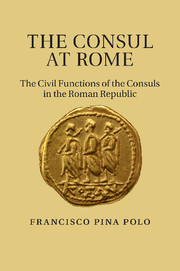Book contents
15 - Conclusion
Published online by Cambridge University Press: 25 October 2011
Summary
Acting in close collaboration with the senate, the consuls were the chief magistrates of the Roman state throughout the Republican period. The distinctive feature of the magistracy was the imperium with which consuls were invested. It was a unique imperium which granted them supreme command, in both the civil and the military sphere. This supreme command involved specific functions and tasks performed by consuls.
– On the one hand, the consuls were always the supreme commanders of the Roman army, in both the middle Republic and the late Republic, since the consuls did not lose their military imperium after Sulla's dictatorship, although from that moment onwards they attained prominence in the military field much less frequently.
– As the right hand of the senate, the consuls were the magistrates the senators relied upon most, those whom they called upon in cases of serious crisis. Thus it is reasonable that the consuls were those referred to initially in most instances in which the so-called ‘ultimate decree of the senate’ or senatus consultum ultimum was proclaimed. This put them in charge of the defence of the state, according to the formula videant consules ne quid res publica detrimenti capiat (‘let the consuls see to it that the Republic suffer no harm’). By doing this, their prominent position in the cursus honorum and their ultimate accountability for the restoration of the internal order of the community were underlined.
[…]
- Type
- Chapter
- Information
- The Consul at RomeThe Civil Functions of the Consuls in the Roman Republic, pp. 329 - 334Publisher: Cambridge University PressPrint publication year: 2011



